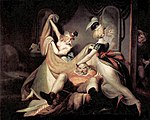|
Falstaff (Salieri)
Falstaff, ossia Le tre burle (Falstaff, or The Three Jokes) is a dramma giocoso in two acts by Antonio Salieri, set to a libretto by Carlo Prospero Defranceschi after William Shakespeare's The Merry Wives of Windsor. One of the earliest operatic versions of Shakespeare's play, Salieri's Falstaff is notable for a general compression and streamlining of the original plot, note the absence of the two young lovers, Fenton and Anne, and the addition of a scene in which Mistress Ford pretends to be German to charm Falstaff (actually two such scenes exist, one in a separate score by Salieri was probably omitted from the original Viennese productions). Defranceschi moves the plot and structure away from Elizabethan drama and closer to the standard conventions of late 18th century opera buffa. Highlights include the Sinfonia (overture) in the style of contra dances.[citation needed] The entire opera shows the influence of Mozart's Le nozze di Figaro, which was being successfully revived at the time. Among the musical highlights, besides the sinfonia, are Falstaff's strutting Act I patter aria, the quartet in Act I, the duettino "La stessa, La stessissima", the technically brilliant "laughter" trio in the opening moments of Act II, the canonical duet of Mr. and Mrs. Ford toward the end of Act II (featuring a rare late 18th century cello solo) and the grand finale to Act II. Throughout the score Salieri employs careful tone painting, parody of opera seria conventions, a more harmonically interesting structure for the secco recitative, and more involved counterpoint; traits that have helped return Falstaff to the playing boards. Performance historyIt was first performed at the Kärntnertortheater in Vienna on 3 January 1799. Twenty-six performances were given between then and 1802. The American premiere took place in 1972 at the Philadelphia Musical Academy with David Agler conducting. The Boston premiere was given by Associate Artists Opera on 15 November 1974 in the National Theater of the Boston Center for the Arts with David Arnold in the title role, supported by Elizabeth Phinney, Pamela Gore, Frank Hoffmeister, and Ernest Triplett, with an English translation by Michael Auclair (who also directed the production) and scenery by William Fregosi. The conductor was Robert Willoughby Jones. Bampton Classical Opera performed it in 2004. Roles
ArrangementsBeethoven used the duet La stessa, La stessissima for a series of variations, WoO 73.[1] Discography
References
Sources
External links |
||||||||||||||||||||||||||||||||||||||||||

